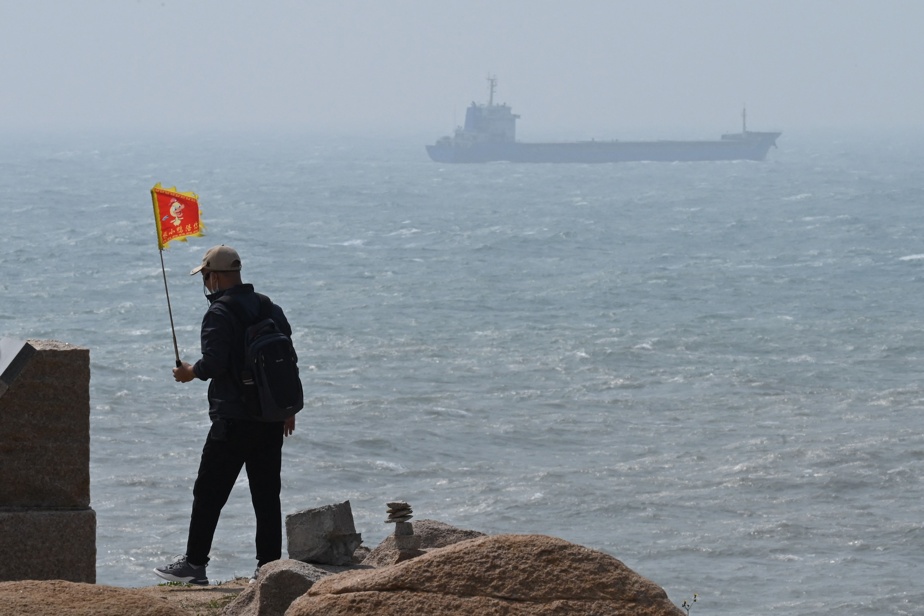(Beijing) China conducted a “total encirclement” drill on the island Saturday in the Taiwan Strait on the first day of military maneuvers that will last until Monday, mobilizing at least nine warships and 71 military aircraft , according to the Taiwan Ministry of Defense.
These maneuvers are presented by experts as retaliation for a recent meeting in the United States between a senior American official and the Taiwanese president who denounced China’s “authoritarian expansionism”.
“Today’s exercise focuses on the ability to take control of the sea, airspace and information…in order to create total deterrence and encirclement” of Taiwan, said Chinese state television on Saturday after the announcement by the army of these operations.
At the start of the operations, the Taiwan Ministry of Defense said it had detected the presence around the island of 13 planes and three Chinese military ships. As of 4 p.m. local time (4 a.m. Eastern Time), the armada consisted of nine ships and 71 military aircraft, according to the ministry.
The means mobilized include warships, fast missile launchers, fighter planes, tankers and jammers.
The maneuvers “serve as serious warnings against collusion between separatist forces seeking ‘Taiwan independence’ and outside forces, as well as their provocative activities,” warned Chinese military spokesman Shi Yi.
The exact location of these drills is not known. The narrowest part between the Chinese coast and the island is about 130 kilometers wide.
These operations, which also include “patrols”, are “necessary to safeguard China’s sovereignty and territorial integrity”, justified the same spokesperson.
Live-fire exercises will be held Monday in the Taiwan Strait near the coast of Fujian (East), the province facing the island, local maritime authorities also said.
These exercises, which have an “operational” dimension, are intended to demonstrate that the Chinese army will be ready “if the provocations intensify” to “settle once and for all the question of Taiwan”, indicates to AFP the military expert Song Zhongping.
The moves follow a meeting Wednesday during a stopover in California between Taiwan President Tsai Ing-wen and Speaker of the US House of Representatives Kevin McCarthy.
Beijing had promised “firm and forceful measures” in retaliation.
On Saturday, Tsai Ing-wen denounced China’s “authoritarian expansionism” and assured that Taiwan would “continue to work with the United States and other countries […] to uphold the values of freedom and democracy”.
China views with displeasure the rapprochement in recent years between the Taiwanese authorities and the United States which, despite the absence of official relations, provides the island with substantial military support.
For Beijing, these military exercises are “a necessity” after an affront to “score points politically” with the Chinese population, James Char, an expert on the Chinese army at Nanyang University of Technology in Beijing, told AFP. Singapore.
However, an escalation of the same intensity as that of last summer seems a priori ruled out, according to Mr. Char who underlines that Beijing, which is trying to “warm up” its relations with Europe, has waited for the “end” of a state visit by French President Emmanuel Macron to launch his exercises.
In August, China engaged in unprecedented military maneuvers around Taiwan and fired missiles when Democrat Nancy Pelosi, who preceded McCarthy to House roost, visited the island.
The United States recognized the People’s Republic of China in 1979 and should theoretically have no official contact with the Republic of China (Taiwan) under the “one China principle” championed by Beijing.
In Pingtan, the closest point to Taiwan in southeast China, tourists watched the choppy waters of the sea but no notable military activity was visible. Others casually posed in front of a giant stamp representing the Chinese coasts and Taiwan, an emblematic monument of Pingtan.
On Liberty Square in the heart of Taipei, many young people gathered in small groups like every weekend did not seem to feel too threatened on Saturday by the Chinese maneuvers. “I think most Taiwanese are used to [the maneuvers]. We just say, and here we go again,” said Jim Tsai, a 16-year-old schoolboy.

